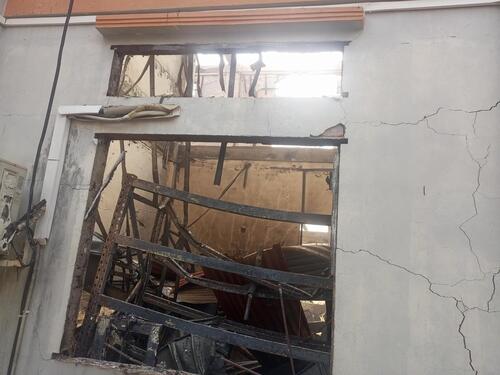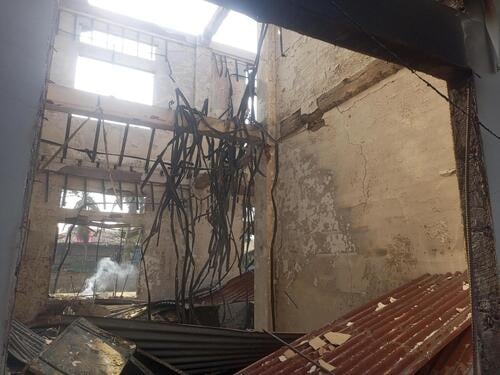Buthidaung – Medecins Sans Frontières (MSF) is deeply alarmed that our office and pharmacy in Buthidaung, Rakhine state, Myanmar, burnt down on 15 April. The burning down of MSF’s office and pharmacy is just the latest blow to what is a decimation of available healthcare options for people in Rakhine state and their continued denial from access to humanitarian assistance.
No staff were injured, but all medical stock and office equipment were destroyed. This includes lifesaving drugs such as antibiotics, instrumental in the treatment of diseases like pneumonia, primarily affecting children under five years old.
The destruction of the MSF office comes amid increasing violence witnessed in Buthidaung since last Friday. We hear reports of more than 200 homes being burned down and witness thousands of people who are displaced by the violence seeking refuge in an area directly across from where our office was located.
We are urging parties to the conflict to respect the protected nature of healthcare facilities as per their obligations under international humanitarian law. We urge relevant authorities to consider the urgent need to expedite approvals for the movement of medical supplies, facilitate our ability to restock the destroyed supplies at our Buthidaung office, and restore humanitarian access, now impeded in the state since November 2023.

For almost six months, MSF has witnessed indiscriminate violence in Rakhine state, severe restrictions on humanitarian access, and a near-total decimation of the healthcare system. We have also been unable to run medical activities in the northern and central parts of the state due to a combination of violence and not receiving travel authorisation from the relevant authorities. This authorisation is required for us to conduct our 25 mobile clinics that provide essential medical services to people living in rural areas and often dependent on these clinics for their access to healthcare.
The number of monthly outpatient consultations MSF is providing to people in Rakhine state has dropped from 6,684 in September 2023 to just 81 in March 2024. These 81 consultations were all done via telephone as we no longer have direct access to patients.
At the start of November 2023, we were able to facilitate some emergency referrals for critical patients who needed access to a hospital for more specialised care, but this has since become more difficult because of the violence. There are reports of deaths, especially among women in labour, who could not reach hospitals. MSF teams have recorded nine maternal deaths or stillbirth cases between November 2023 and March 2024.
In one case on 4 February, a pregnant Rohingya woman and her baby reportedly died after being forced to return to Kyein Ni Pyin camp (located on an island in Pauktaw Township) because she was not granted entry at Sittwe. Entry to Sittwe is needed to continue the journey to Sittwe General hospital. MSF’s facilitation of emergency referrals is a lifesaving service that Rohingya people depend on due to the severe restrictions imposed on their freedom of movement.
In March, both the Maungdaw and Buthidaung hospitals in northern Rakhine stopped functioning. These two hospitals were where MSF was referring patients to in northern Rakhine, and their closure means more than one million people now have no options for emergency or advanced healthcare, including services for complicated pregnancies. The forced closure and targeting of health facilities, and the blocking of people’s access to health facilities, are unacceptable.
All communities in Rakhine state have been adversely impacted by years of armed conflict, related socio-economic challenges, and restriction on movements. We are gravely concerned for the welfare of Rohingya communities who, due to their lack of legal status and restrictions imposed on their freedom of movement, are being confronted with unimaginable choices for their survival.



